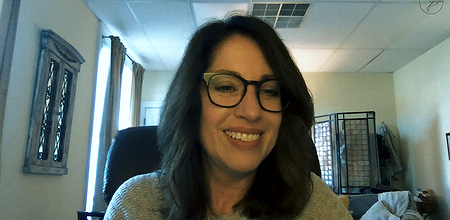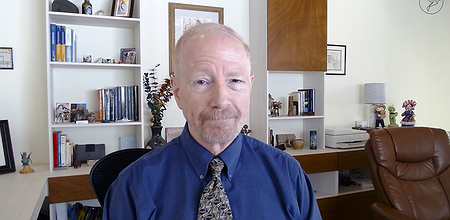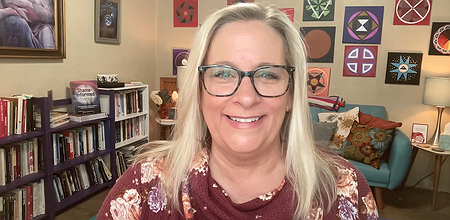This workshop includes theory as well as clinical examples. It includes videos ranging from 5-15 minutes in length. The PowerPoint of the workshop can be downloaded.
Integrative Harm Reduction Approach in Treating Substance Misuse
Dr. Andrew Tatarsky, Psychologist
Strategies to develop a healthier relationship with substances.
Excerpt: scientific revolution
- 6h of continuing education
- 35 lessons that last from 5 to 15 minutes each
- 1 certificate of achievement
- 1 power-point
- 1 bibliography
- 1 course evaluation
- 4 months access - automatically extended until you complete the course
- 7-day money back guarantee
- 95% of participants who completed the satisfaction survey declare they would recommend this course to a colleague
Overview
Accumulating evidence is moving us away from moral, criminal, and reductive disease models and instead toward understanding substance use as a psychobiosocial process with multiple dimensions and individual variations. This shift calls for a personalized, Integrative Harm Reduction Psychotherapy (IHRP) for problematic substance users.
In this comprehensive workshop, Dr. Tatarsky will discuss the limitations of the dominant disease model and abstinence-only recovery narrative and introduce the psychobiosocial model of addiction and IHRP based on it. IHRP integrates harm reduction principles into psychotherapy and substance use treatment.
This new model of treatment combines relational psychoanalytic, cognitive behavioral, and mindfulness techniques in a harm reduction frame to support positive change in substance use and related issues.
IHRP’s seven therapeutic tasks will be described:
- Managing the therapeutic alliance with harm reduction listening;
- The therapeutic relationship heals;
- Enhancing self-regulation and self-management skills;
- Assessment as treatment;
- Embracing ambivalence;
- Harm reduction goal setting;
- Strategizing for change: ideal use plan.
Specific skills and strategies that participants can begin using immediately will be demonstrated. The workshop will also give special attention to understanding the potential benefits and risks associated with Marijuana and the application of IHRP to develop ideal relationships with this substance.
About the expert
![Picture of Andrew Tatarsky [en]](/media/studeo/teachers/2020/andrew.png.500x500_q85_box-0%2C0%2C250%2C250_crop_detail.png)
Dr. Andrew Tatarsky, psychologist, has developed integrative harm reduction psychotherapy (IHRP) for treating the spectrum of risky and addictive behavior. IHRP brings psychoanalysis, CBT, and mindfulness together in a harm reduction frame.
The therapy has been described in his book, Harm Reduction Psychotherapy: A New Treatment for Drug and Alcohol Problems, and in a series of papers.
Dr. Tatarsky holds a PhD in clinical psychology from the City University of New York and is a graduate of New York University’s Postdoctoral Program in Psychoanalysis and Psychotherapy.
He is founder and director of the Center for Optimal Living in NYC, a treatment and training center; founding member and past-president of the Division on Addiction of New York State Psychological Association, and a member of the Medical and Clinical Advisory Boards of the New York State Office of Alcoholism and Substance Abuse Services. Dr. Tatarsky, psychologist, has trained professionals in harm reduction both nationally and internationally.
Learning objectives
- Identify four of the seven therapeutic tasks of Integrative Harm Reduction Psychotherapy
- Define the psychobiosocial process model of addiction
- Learn the four core harm reduction engagement skills: empathic listening, collaborative inquiry with an alliance around compassionate curiosity, empathic reflection and checking in with therapeutic humility
- Learn “urge-surfing”, a technique for interrupting addictive urges and action to facilitate healing, growth and positive behavior change. This brings mindfulness and breath to the urge enabling pause
Learning material
Syllabus
- PowerPoint
- Handouts
-
About Marijuana
- 1. Introduction
- 2. Scientific Revolution
- 3. Marijuana Accounts, Addiction and Medical
- 4. Define Marijuana
- 5. Medical Marijuana
- 6. Ten Perspectives on Marijuana
- 7. Questions from the public
-
The need for a new paradigm
- 8. Our Challenge- How can we make treatment more appealing for people
- 9. Harm Reduction Embodies Compassionate Pragmatism
- 10. Harm Reduction as Engagement Strategy
- 11. Questions from the public 2
- 12. Stages of Change
- 13. We need a new model for understanding substance misuse to inform more effective treatment
-
About addiction
- 14. Define Addiction
- 15. Moral modal, criminal modal, Many meanings
- 16. Trauma
- 17. Learning and Spirituality
- 18. Social context and Psychobiosocial Model
- 19. Valerie's case
- 20. Questions from the public 3
-
How harm reduction pscychotherapy works and how to use it?
- 21. Harm Reduction Psychotherapy
- 22. Integrative Harm Reduction Psychotherapy Domains
- 23. Seven Therapeutic Tasks of IHRP
- 24. Managing the Therapeutic Alliance
- 25. Enhancing Self-regulation Skills
- 26. Question from the public 4
- 27. The Urge is the Axis of Change
- 28. Questions from the public 5
- 29. Urge Surfing Exercise
- 30. Assessment as Treatment
- 31. Exercice about Urge surfing
- 32. Embracing Ambivalence
- 33. Goal Setting
- 34. Ideal Use Plan
- 35. Questions from the public 6
- Bibliography
CE Credits
Download a certificate of successful completion.
Audience
This training is intended for mental health professionals.
Your comments
"Very informative course based on extensive knowledge and experience in the field. Dr. Tatarsky is a wonderful presenter! Thank you for such a valuable course"
A psychologist (Canada)
"Thank you so much for this course; it is a practical course with updated approaches and sources.
As a suggestion, it is more helpful if some role playing is added to this course."
A psychotherapist (Canada)
"The ideas were very clearly presented and the material very useful.I enjoyed listening throughout."
A psychologist (Canada)
"One of the best online trainings I have attended so far.. It has been incredibly well presented, helpful and inspiring. Thank you!"
A psychotherapist (Slovakia)
"Very interesting and easy to follow."
A social worker (Canada)
"Very helpful and enlightening, and progressively thought provoking in terms of looking at new ways of effective change in therapeutic ways including systemically."
A psychologist (Canada)
Registration
Ask a question
Do you have a question? Then email us at contact@asadis.net
Frequently asked questions
-
How long do I have access to the course?
After your registration, the course is accessible anytime and from anywhere for 124 days. And if that’s not enough, we’ll automatically extend your access.
-
When does the course start?
That is entirely up to you! When you buy a course, you'll receive an access link that you can activate when you want.
-
Is there a student rate?
Yes there is! To learn more, email us at contact@asadis.net.
You may also be interested in:
Legal notice
The courses offered by ASADIS are accredited by different professional organisations. In addition, ASADIS is approved by the Canadian Psychological Association to offer continuing education for psychologists. ASADIS maintains responsibility for the program.
The CPA’s approval of an individual, group, or organization as a CE Sponsor or Provider is restricted to the activities described in the approved application or annual report form. The CPA’s approval does not extend to any other CE activity the Sponsor or Provider might offer. In granting its approval, the CPA assumes no legal or financial obligations to Sponsors, Providers, or to those individuals who might participate in a Sponsor or Provider’s CE activities or programs. Further, responsibility for the content, provision, and delivery of any CE activity approved by the CPA remains that of the CE Sponsor or Provider. The CPA disclaims all legal liability associated with the content, provision, and delivery of the approved CE activity.





